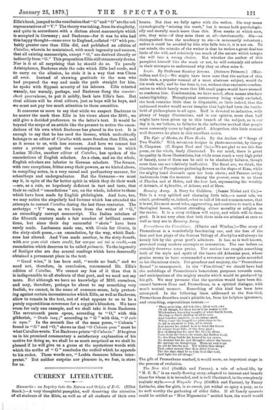Prometheus the Fire-Giver. (Chatto and Windus.)—The story of Prometheus is
a wonderfully fascinating one, and the loss of the first and last plays of the famous Trilogy of 2Eschylus will always be keenly felt by the great poet's admirers. It has, as is well known, provoked many modern attempts at restoration. The one before us certainly deserves some praise. The author has caught something both of the style and spirit of the brave old Athenian poet, whose genius seems to have commanded a reverence never quite accorded to his illustrious rivals. For grandeur and majesty, the "Prometheus Bound" is unsurpassed. In the "Fire-Giver," we should have had the nufoldings of Prometheus's benevolent purposes towards man, and anticipations of the mighty results which would be produced by his gift. We may presume that the question would have been dis- cussed between Zeus and Prometheus, in a spirited dialogue, with much mutual menace. Something of this kind has been hero attempted. In the following lines, addressed to the Sun-God, Prometheus describes man's pitiable lot, from his helpless ignorance, and crouching, superstitious terrors :— "Thee seest him. All-beholder, filled with awe
Of all things, for thou know'st he wakes to life Wisdondeas, knowing nought of what Earth bears, Moving or fixed, finding in all he sees And touches, marvels, as an infant shall, When come the longed for after-days to he.
So all is mystery to him, all is dread, Nor knows be, naked, how to fend the frosts Of winter from him, or thy fiery gaze; Nor clothing has he, save the bloody skins Torn from the beasts he rends, his tireless food, No dwelling builds he, housed in icy eaves, No dreams has he, nor thoughts above the brutes He springs on, hungering. Memory and hope As yet he knows not. Yet within him sleeps That other nature that thou didst bestow, The fire that shall be to him God-like soul, And light for all things."
The gift of Prometheus marked, it would seem, an important stage in the process of evolution.


































 Previous page
Previous page